大学英语第三版课后答案
新编大学英语综合教程3第三版部分课后答案
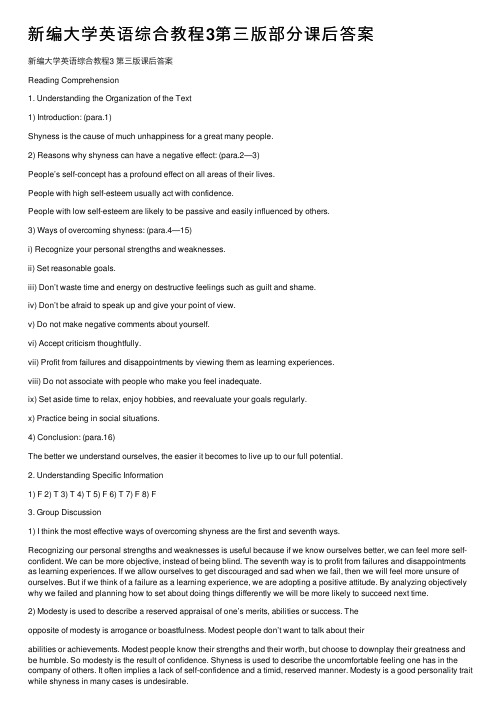
新编⼤学英语综合教程3第三版部分课后答案新编⼤学英语综合教程3 第三版课后答案Reading Comprehension1. Understanding the Organization of the Text1) Introduction: (para.1)Shyness is the cause of much unhappiness for a great many people.2) Reasons why shyness can have a negative effect: (para.2—3)People’s self-concept has a profound effect on all areas of their lives.People with high self-esteem usually act with confidence.People with low self-esteem are likely to be passive and easily influenced by others.3) Ways of overcoming shyness: (para.4—15)i) Recognize your personal strengths and weaknesses.ii) Set reasonable goals.iii) Don’t waste time and energy on destructive feelings such as guilt and shame.iv) Don’t be afraid to speak up and give your point of view.v) Do not make negative comments about yourself.vi) Accept criticism thoughtfully.vii) Profit from failures and disappointments by viewing them as learning experiences.viii) Do not associate with people who make you feel inadequate.ix) Set aside time to relax, enjoy hobbies, and reevaluate your goals regularly.x) Practice being in social situations.4) Conclusion: (para.16)The better we understand ourselves, the easier it becomes to live up to our full potential.2. Understanding Specific Information1) F 2) T 3) T 4) T 5) F 6) T 7) F 8) F3. Group Discussion1) I think the most effective ways of overcoming shyness are the first and seventh ways.Recognizing our personal strengths and weaknesses is useful because if we know ourselves better, we can feel more self-confident. We can be more objective, instead of being blind. The seventh way is to profit from failures and disappointments as learning experiences. If we allow ourselves to get discouraged and sad when we fail, then we will feel more unsure of ourselves. But if we think of a failure as a learning experience, we are adopting a positive attitude. By analyzing objectively why we failed and planning how to set about doing things differently we will be more likely to succeed next time.2) Modesty is used to describe a reserved appraisal of one’s merits, abilities or success. Theopposite of modesty is arrogance or boastfulness. Modest people don’t want to talk about theirabilities or achievements. Modest people know their strengths and their worth, but choose to downplay their greatness and be humble. So modesty is the result of confidence. Shyness is used to describe the uncomfortable feeling one has in the company of others. It often implies a lack of self-confidence and a timid, reserved manner. Modesty is a good personality trait while shyness in many cases is undesirable.3) B eing shy isn’t necessarily a bad thing. It is appropriate and normal to be shy in some circumstances, for example, in the presence of teachers, your boss, your parents’ friends or your prospective in-laws; when you are dating someone, especially the first time; when you are with stranger s; when you are in a new environment; when you’re facing a large audience. In fact, it can even be helpful to be a little shy. When you’re shy and keep silent, you may spend a little time observing the surroundings and people around before jumping right into the new situation.Vocabulary1. “Self-”is a prefix which means “of, to or by oneself or itself” .Words with the prefix “self-” that appear in the text: self-conscious, self-concept, self-assurance, self-worth, self-confidence, self-esteem, self-destructive, self-awareness, self-acceptance, self-rejection, self-confident.1) self-conscious (worried and embarrassed about what you look like or what other people think of you)2) self-confidence (belief in one’s own ability, power, judgment, etc.; confidence in oneself)3) self-esteem (the feeling that you are someone who deserves to be liked, respected, or admired)4) self-destructive (with thoughts or actions that are counter to one’s own best interests)5) self-worth (the value you give to your life and achievements)6) self-concept (one’s conception or general idea of one’s own basic character and nature)7) self-awareness (realistic knowledge and judgment about oneself)8) self-assurance/self-confidence (the belief that you are able to deal with people and problems easily)2. Part A1) G 2) I 3) A 4) F 5) C 6) D 7) J 8) B 9) E 10) HPart B1) profound 2) jealousy 3) overcome 4) eventually 5) compliments6) diminish 7) reassurance 8) detrimental 9) isolated 10) accented3. 1) reflected 2) concerned/worried 3) profound effect/influence 4) viewed/regarded 5) sensitive 6) respond/react 7) eliminated 8) overcome my fear 9) concentrate on 10) made no commentTranslation1. Shyness can vary from feeling mild discomfort to high levels of anxiety that impact us in almosteverything we do.2. Despite his stubbornness, he knew in his heart that he should avoid arousing any suspicions.3. It will be interpreted as criticism no matter what you say.4. Let’s not allow ourselves to be upset by trifles (which) we should despise and forget.5. Too much time spent dwelling on the past can get in the way of enjoying life as it happens.6. People who believe they can accomplish goals and solve problems are more likely to do well inschool.Further Development1. Enriching Your Word Power1) B 2) B 3) A 4) B 5) C 6) C 7) C 8) A 9) A 10) C哈哈,等我再上传啦。
大学英语3第3版课后题翻译答案
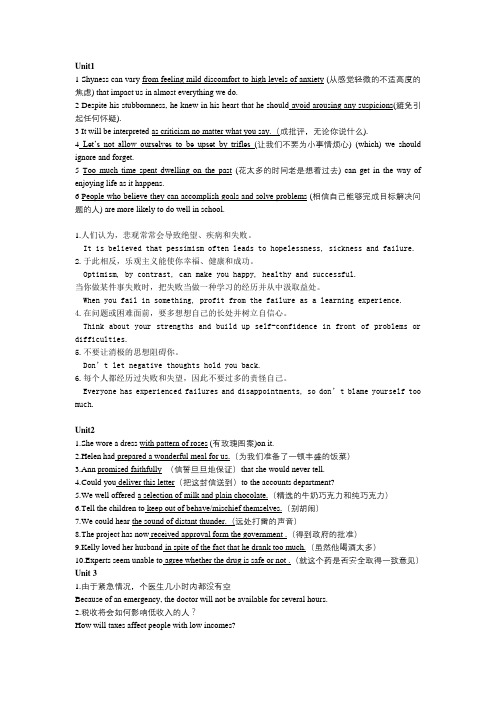
Unit11 Shyness can vary from feeling mild discomfort to high levels of anxiety (从感觉轻微的不适高度的焦虑) that impact us in almost everything we do.2 Despite his stubbornness, he knew in his heart that he should avoid arousing any suspicions(避免引起任何怀疑).3 It will be interpreted as criticism no matter what you say.(成批评,无论你说什么).4 Let’s not allow ourselves to be upset by trifles (让我们不要为小事情烦心) (which) we should ignore and forget.5 Too much time spent dwelling on the past (花太多的时间老是想着过去) can get in the way of enjoying life as it happens.6 People who believe they can accomplish goals and solve problems (相信自己能够完成目标解决问题的人) are more likely to do well in school.1.人们认为,悲观常常会导致绝望、疾病和失败。
It is believed that pessimism often leads to hopelessness, sickness and failure. 2.于此相反,乐观主义能使你幸福、健康和成功。
Optimism, by contrast, can make you happy, healthy and successful.当你做某件事失败时,把失败当做一种学习的经历并从中汲取益处。
新视野大学英语第三版第三册课后习题答案
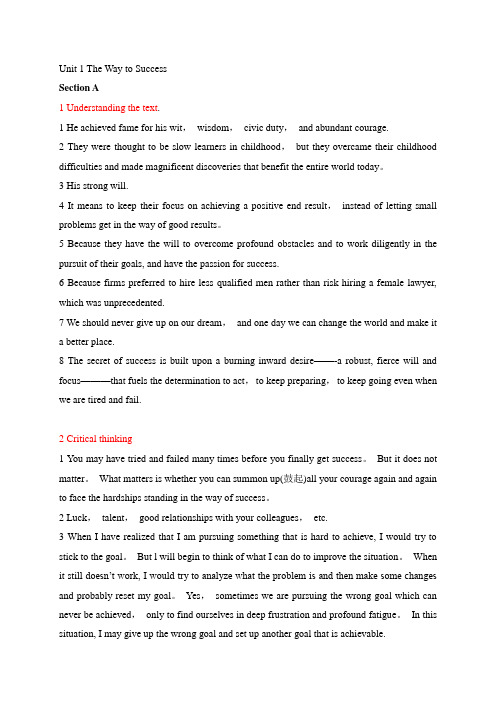
Unit 1 The Way to SuccessSection A1 Understanding the text.1 He achieved fame for his wit,wisdom,civic duty,and abundant courage.2 They were thought to be slow learners in childhood,but they overcame their childhood difficulties and made magnificent discoveries that benefit the entire world today。
3 His strong will.4 It means to keep their focus on achieving a positive end result,instead of letting small problems get in the way of good results。
5 Because they have the will to overcome profound obstacles and to work diligently in the pursuit of their goals, and have the passion for success.6 Because firms preferred to hire less qualified men rather than risk hiring a female lawyer, which was unprecedented.7 We should never give up on our dream,and one day we can change the world and make ita better place.8 The secret of success is built upon a burning inward desire——-a robust, fierce will and focus———that fuels the determination to act,to keep preparing,to keep going even when we are tired and fail.2 Critical thinking1 You may have tried and failed many times before you finally get success。
大学英语精读第三版第一册课后习题全部答案
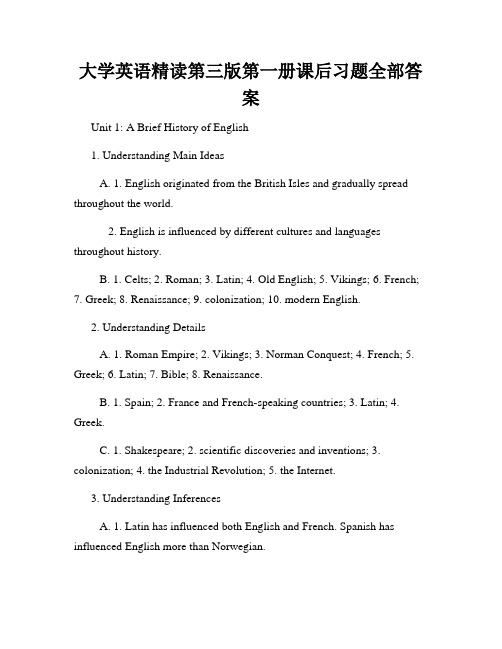
大学英语精读第三版第一册课后习题全部答案Unit 1: A Brief History of English1. Understanding Main IdeasA. 1. English originated from the British Isles and gradually spread throughout the world.2. English is influenced by different cultures and languages throughout history.B. 1. Celts; 2. Roman; 3. Latin; 4. Old English; 5. Vikings; 6. French;7. Greek; 8. Renaissance; 9. colonization; 10. modern English.2. Understanding DetailsA. 1. Roman Empire; 2. Vikings; 3. Norman Conquest; 4. French; 5. Greek; 6. Latin; 7. Bible; 8. Renaissance.B. 1. Spain; 2. France and French-speaking countries; 3. Latin; 4. Greek.C. 1. Shakespeare; 2. scientific discoveries and inventions; 3. colonization; 4. the Industrial Revolution; 5. the Internet.3. Understanding InferencesA. 1. Latin has influenced both English and French. Spanish has influenced English more than Norwegian.B. 1. The French-speaking Normans ruled England after the Norman Conquest. French vocabulary entered English as a result.C. 1. The colonization of America and the spread of the British Empire promoted the use of English worldwide.4. Understanding VocabularyA. 1. E; 2. E; 3. C; 4. D; 5. B; 6. C; 7. A; 8. E; 9. B; 10. D; 11. C; 12. A;13. A; 14. C; 15. D; 16. B.B. 1. evolution; 2. consolidation; 3. influx; 4. prosperity; 5. dominance;6. expansion;7. fluctuations;8. prevalence.Unit 2: Cultural Differences and Cultural Shock1. Understanding Main IdeasA. 1. Cultural differences can lead to misunderstandings and conflicts.2. Cultural shock is a common experience for people in a new cultural environment.B. 1. cultural differences; 2. culture shock.2. Understanding DetailsA. 1. The way people greet each other; 2. Personal space; 3. Eye contact; 4. Time orientation.B. 1. etiquette; 2. gestures; 3. customs; 4. lifestyles; 5. values.3. Understanding InferencesA. 1. Expectations and behaviors vary across different cultures.B. 1. It is essential to understand and adapt to a new culture to avoid misunderstandings and conflicts.4. Understanding VocabularyA. 1. C; 2. A; 3. E; 4. C; 5. D; 6. B; 7. E; 8.B.B. 1. perception; 2. encounter; 3. adapt; 4. reverse; 5. undergo.Unit 3: The Beginnings of Isolation1. Understanding Main IdeasA. 1. The narrator's solitude on the island gives him a sense of freedom and empowerment.2. The narrator is concerned about the presence of "wild things" on the island.B. 1. solitude; 2. wild things.2. Understanding DetailsA. 1. The narrator occupies himself with building, exploring, and observing nature on the island.B. 1. The narrator feels like the "king" of the island and enjoys the freedom it brings.2. The narrator is cautious about the "wild things" and their potential threat to him.3. Understanding InferencesA. 1. The narrator's newfound solitude allows him to escape the restrictions and expectations of society.B. 1. The narrator's isolation might lead to psychological challenges and fear.4. Understanding VocabularyA. 1. A; 2. D; 3. B; 4. E; 5. C; 6. D; 7. A; 8.B.B. 1. solitude; 2. companionship; 3. survival; 4. vulnerability.。
大学英语精读第三版第三册课后习题答案
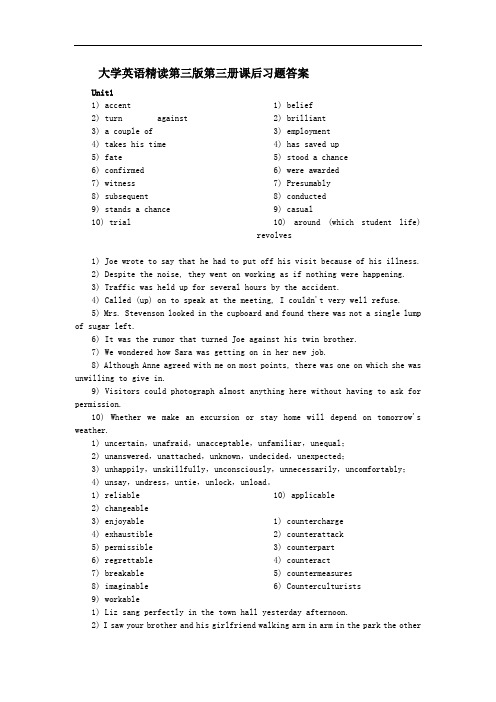
大学英语精读第三版第三册课后习题答案Unit11) accent2) turn against3) a couple of4) takes his time5) fate6) confirmed7) witness8) subsequent9) stands a chance10) trial1) belief2) brilliant3) employment4) has saved up5) stood a chance6) were awarded7) Presumably8) conducted9) casual10) around (which student life) revolves1) Joe wrote to say that he had to put off his visit because of his illness.2) Despite the noise, they went on working as if nothing were happening.3) Traffic was held up for several hours by the accident.4) Called (up) on to speak at the meeting, I couldn't very well refuse.5) Mrs. Stevenson looked in the cupboard and found there was not a single lump of sugar left.6) It was the rumor that turned Joe against his twin brother.7) We wondered how Sara was getting on in her new job.8) Although Anne agreed with me on most points, there was one on which she was unwilling to give in.9) Visitors could photograph almost anything here without having to ask for permission.10) Whether we make an excursion or stay home will depend on tomorrow's weather.1) uncertain,unafraid,unacceptable,unfamiliar,unequal;2) unanswered,unattached,unknown,undecided,unexpected;3) unhappily,unskillfully,unconsciously,unnecessarily,uncomfortably;4) unsay,undress,untie,unlock,unload。
大学英语精读第三版第一册课后习题-答案

Unit6 翻译1) 据报道,那条铁路曾因洪水而停止修建。
It was reported that the building of the railway had been held up by a flood.2) 罢工结果,资方接受了工人的要求。
The strike resulted in the management's accepting the workers' demands.3) 煤矿工人们决定为争取更好的工作条件举行罢工。
The coalminers decided to go on strike for better working conditions.4) 我很想买这本英文词典,遗憾的是我身上带的钱不够。
I'd like very much to buy the English dictionary. Unfortunately,I haven't got enough money on me.5) 我想先和你讨论一下这篇文章的英译稿,然后再把它寄给霍布斯先生。
I'd like to talk over with you about the English translation of the article before sending it to Mr. Hobbs.6) 那位外国专家希望在三年内达到所有的目标。
The foreign expert hopes to achieve all his aims in three years.7) 一个科学家要跟上本领域的新发展,你认为必须做些什么?What do you think a scientist must do in order to keep up withthe latest developments in his field?8) 作者认为,如果优秀工人经常得到加薪和提拔,他们就会有更大的生产积极性。
大学英语精读第三版第一册课后习题全部答案
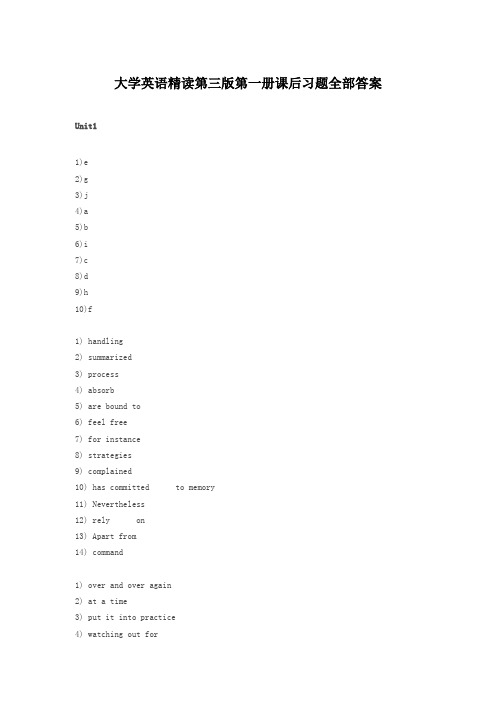
大学英语精读第三版第一册课后习题全部答案Unit11)e2)g3)j4)a5)b6)i7)c8)d9)h10)f1) handling2) summarized3) process4) absorb5) are bound to6) feel free7) for instance8) strategies9) complained10) has committed to memory11) Nevertheless12) rely on13) Apart from14) command1) over and over again2) at a time3) put it into practice4) watching out for5) by no means6) concentrate on7) In addition t8) in detail1)action2)employ3)announce4)examination5)communication6)express7)compose8)improvement9)concentration10)management11)consider12)motivate13)development14)movement15)discuss16)operate17)division18)production19)educate20)repeat1) additional2) add3) addition4) addition1) effectively2) effect3) effective4) effect1) helpful2) help3) helpless4) help5) helplessly6) helpfully7) helpful1) reliant2) reliable3) reliance reliable4) relies5) reliably6)1) repetition2) repeating3) repeatedly4) repeated5) repetition1) In my opinion2) According to Mary3) In our opinion4) According to today's papers5) In most doctors' opinion According to most doctors1) Shakespeare was not only a dramatist but also an actor.2) Miss Crain not only took me home in her car, but also came the next day to see if I had recovered.3) Hainan Island attracts tourists not only in winter but also in summer.4) There is always a black market not only in Britain, but also in other European countries.5) At the Athens Olympics in 2004, Liu Xiang not only won a gold medal in the 110-meter hurdles, but also broke the Olympic record.1) It is true that your sentences are all grammatically correct, but they don’t make any sense.2) It is true that they lost that battle, but they still went on fighting.3) It is true that Tom’s very clever and hardworking, but I still don’t think he is the right person for the job.4) It is true that learning English is by no means easy, but we can make the task easier by using some learning strategies.1) strategies2) frequently3) over and over again4) commit to memory5) acquaintance6) watch out for7) communicate8) process9) opportunities10) rely on11) put into practice12) absorbed1) if2) about3) it4) know5) up6) as7) addition8) even9) into10) other11) for12) while1) memorize2) a matter of3) taught4) shelf5) realize6) written7) idiomatic8) join in9) difference10) gain a good command翻译1) 史密斯太太对我抱怨说,她经常发现与自己十六岁的女儿简直无法沟通。
大学英语精读第三版第一册课后习题全部答案
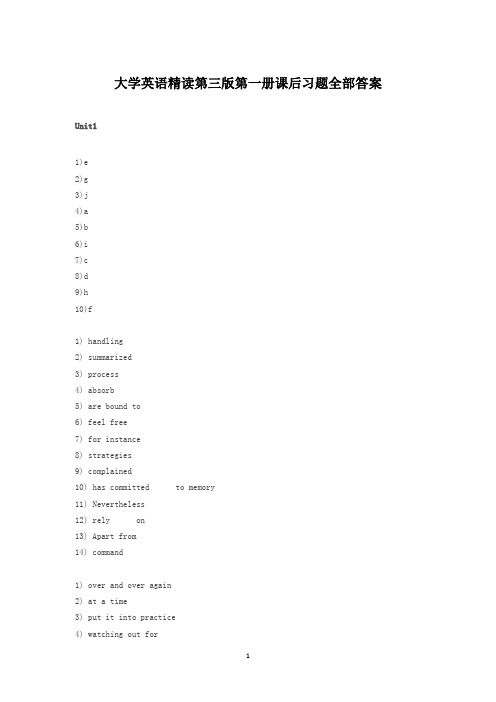
大学英语精读第三版第一册课后习题全部答案Unit11)e2)g3)j4)a5)b6)i7)c8)d9)h10)f1) handling2) summarized3) process4) absorb5) are bound to6) feel free7) for instance8) strategies9) complained10) has committed to memory11) Nevertheless12) rely on13) Apart from14) command1) over and over again2) at a time3) put it into practice4) watching out for5) by no means6) concentrate on7) In addition t8) in detail1)action2)employ3)announce4)examination5)communication6)express7)compose8)improvement9)concentration10)management11)consider12)motivate13)development14)movement15)discuss16)operate17)division18)production19)educate20)repeat1) additional2) add3) addition4) addition1) effectively2) effect3) effective4) effect1) helpful2) help3) helpless4) help5) helplessly6) helpfully7) helpful1) reliant2) reliable3) reliance reliable4) relies5) reliably6)1) repetition2) repeating3) repeatedly4) repeated5) repetition1) In my opinion2) According to Mary3) In our opinion4) According to today's papers5) In most doctors' opinion According to most doctors1) Shakespeare was not only a dramatist but also an actor.2) Miss Crain not only took me home in her car, but also came the next day to see if I had recovered.3) Hainan Island attracts tourists not only in winter but also in summer.4) There is always a black market not only in Britain, but also in other European countries.5) At the Athens Olympics in 2004, Liu Xiang not only won a gold medal in the 110-meter hurdles, but also broke the Olympic record.1) It is true that your sentences are all grammatically correct, but they don’t make any sense.2) It is true that they lost that battle, but they still went on fighting.3) It is true that Tom’s very clever and hardworking, but I still don’t think he is the right person for the job.4) It is true that learning English is by no means easy, but we can make the task easier by using some learning strategies.1) strategies2) frequently3) over and over again4) commit to memory5) acquaintance6) watch out for7) communicate8) process9) opportunities10) rely on11) put into practice12) absorbed1) if2) about3) it4) know5) up6) as7) addition8) even9) into10) other11) for12) while1) memorize2) a matter of3) taught4) shelf5) realize6) written7) idiomatic8) join in9) difference10) gain a good command翻译1) 史密斯太太对我抱怨说,她经常发现与自己十六岁的女儿简直无法沟通。
- 1、下载文档前请自行甄别文档内容的完整性,平台不提供额外的编辑、内容补充、找答案等附加服务。
- 2、"仅部分预览"的文档,不可在线预览部分如存在完整性等问题,可反馈申请退款(可完整预览的文档不适用该条件!)。
- 3、如文档侵犯您的权益,请联系客服反馈,我们会尽快为您处理(人工客服工作时间:9:00-18:30)。
Unit 1 PersonalityVocabulary (P16)3. 1) profound 2) jealousy 3) numerous 4) overweight 5) overcome 6) eventually 7) slim 8) compliments 9) diminish 10) reassurance 11) detrimental 12) isolated 13) self-esteem 14) accented4. 1) reflected 2) concerned/worried 3) profound effect/influence 4) viewed/regarded5)sensitive6) respond/react 7)eliminated 8)overcome my fear 9) concentrate on 10) made no comment Translation (P17)1) You should spend a reasonable amount of time relaxing and exercising.2) In general children are healthier and better educated than ever before.3) When the right opportunity comes along, he’ll take it.4) Every day he sets aside some time to be with his family and enjoy life.5) I remember those dark streets and walking hand in hand with my father.6) He finally failed to live up to his parents’ expectations.7) In contrast, our use of oil has increased enormously.8) He succeeded in his efforts to overcome his fatal weakness.Unit 3 Social ProblemsVocabulary (P112)2. 1) constantly 2) impact 3) burden 4) Candidly 5) fulfillment6) salaried 7) resentment 8)assistance 9)perfect 10) suppress3. 1) successfully 2) resentment 3)security 4) necessity 5) advisable6) access/accessibility 7) athletic 8) maturity 9) emotional 10) effectivelyTranslation (P113)1) Because of an emergency, the doctor will not be available for several hours.2) How will taxes affect people with low income3) My mother always told me that in the long run I would be glad I didn’t give up practicing the piano.4) These books range in price form $10 to $20.5) It seems to me that you don’t have much choice.6) Given their inexperience, they have done quite a good job.7) For such a big house the price is fairly cheap/low, but you’ve got to take into consideration the money you will spend on repairs.8) Can we begin with discussing questions/problems arising from the last meetingUnit 4 Career PlanningVocabulary (P161)1. 1) acceptable 2) efficiency 3) implications 4) instability 5) rationalize 6) evaluation 7) foreseeable8) invention 9) hastily 10)probability 11) professional 12)challenging 13)defensive 14) personality2) 1) in case 2) Every so often 3) resort to 4) talk over 5) start over 6) in reality 7) at stake 8) seized on9) leading to 10) take stock of3. 1) programs 2) way 3) technical 4) both 5) provided 6) who 7) such 8) needed 9) opportunities10) when 11) to 12) Completion 13) holding 14) early 15) hire 16) promote 17) up 18) educatingTranslation (P163)1) He underwent a major heart surgery several years ago.2) We estimated that it would take a week to finish the work.3) I used to enjoy photography, but I now have no time to pursue any hobbies.4) You may love someone but not necessarily have to marry him.5) Terrorists resort to violence to achieve their political aims.6) He says he’ll stay in the office this afternoon in case you want to see him.7) Scientists have identified the gene that causes abnormal growth.8) These examples demonstrate how badly some students write their resumes.Unit 5 LanguageVocabulary (P215)1. Section B 1) renewed 2) apply 3) persist 4) succeeded 5) drop6) revealed 7) wonder 8) keenly 9) vainly 10) impressed2. 1) unconsciously 2) expectant 3) eventful 4) immeasurable5) imitation/imitating 6) continually 7) tenderness 8) impatientTranslation (P216)1) Seeing all the people walking to and fro outside the office, I became more worried.2) In time he will see who is his true friend.3) That scientist’s experiment gave birth to a new drug.4) He had been shut in by illness during much of the winter.5) They would practice spoken English at the first opportunity.6) Everything she valued might be swept away overnight.7) Towards the close of the term, all the students are busy preparing for the finals.8) It is a very cold winter and we long for it to be over.Unit 6 Man and AnimalsVocabulary (P255)3. 1) survive 2) conflicts 3) available 4) likely 5) injuring6) absorbed 7) competition 8) instinct 9) hesitated 10) similar4. 1) ensure 2) population 3) characteristic 4) exhibit 5) defense6) familiar 7) territory 8) case 9) minute 10) aggressiveTranslation (P256)1) She always behaves badly when her aunt comes to visit.2) If it hadn’t been for your help, we wouldn’t have been able to finish the task in time.3) I warned him off going to the east coast because it was full of tourists.4) The fact that something is cheap doesn’t necessarily mean it’s of low quality.5) Without anyone to turn to for help, making an appropriate choice can be difficult.7) Only if Peter goes to the evening party will she go.8) I can only compare the experience to a nightmare.Unit 7 They Joy of TravelVocabulary (P294)1. 1) engagement 2) separating 3) influences 4) arranged 5) chosen6) In case 7) processed 8) changes 9) benefited 10) go on2. 1) end 2) booked 3) trapped 4) book 5) ended 6) appeal 7) trap 8) appeal9) samples 10) structure 11) value 12) structured 13) sampled 14) process 15) valued 16) process3. 1) A. emptied B. emptiness 2) A. terrified B. terrifying3) A. entertaining B. entertainment 4) A. introductory B. introduction5) A. employed B. employment 6) A. transform B. transformation7) A. convinced B. convincing 8) A. approval B. approve9) A. isolates B. isolation . reinforcement B. reinforcedTranslation (P296)1) I didn’t realize putting on/staging a play involved so much work.2) The most important thing is not what you say but what you do.3) This is the best result that can be expected in such circumstances.4) It isn’t the first time that you’ve found yourself in such a situation.5) This difficulty challenges my mind to find an answer.6) The new threat on the horizon is unemployment.7) We have alternative ways of expressing the same idea.8) He slipped into the old habit of drinking.Unit 9 MusicVocabulary (P386)1. 1) stimulate 2) distract 3) qualify/be qualified 4) induce 5) accelerate6) soothe 7) overtaken 8) wander 9) combine 10) commissionedTranslation (P387)1) I took advantage of the fine weather today to play tennis.2) You may even swim in the lake—if you feel inclined to.3) The loud music brought on another one of his headaches.4) A careless person is apt to make mistakes.5) The experiment resulted in the discovery of a cure for cancer.6) Comparatively speaking, we are more concerned with work efficiency and product development.7) Doctors said that surgery could induce heart attack.8) I qualified/was qualified as a doctor at London University 30 years ago.。
